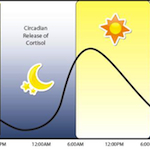Not being able to sleep is the worst feeling ever! Your body is begging you to pass out but your mind is busy trying to solve the worlds problems. Situational insomnia, like staying in a hotel room or arguing with a loved one, can sometimes be unavoidable. Restless sleeps night after night however, is the body’s way of telling us that something is wrong.
What many people don’t understand is that hormones control our sleep cycle and our sleep cycle helps control many of our hormones. This, in part, is why chronic insomnia is a major risk factor for a lot of health concerns like cancer, heart disease, and diabetes.
One of the biggest causes of insomnia is stress. The stress hormone cortisol can pretty much explain sleep disturbances in most people. Sometimes, the challenge is trying to find out where the elevated cortisol is coming from!
One of the biggest sources of stress is actually inflammation, which can raise cortisol levels. Many people that have insomnia deny having emotional stress, (or they may just be in denial), but physiological stress from inflammation in the body can be a silent source of stress that elevates cortisol and may lead to insomnia. Physiological stress may come from an injury or chronic pain, but can also result from digestive issues and food intolerance, among many other causes.
Alcohol is also another common source of stress to the body! I’m not saying a glass of wine is bad, but many people suffer from rebound insomnia when drinking alcohol before bed. People usually report no trouble falling to sleep, but will typically wake up between 1 and 3 am when the body is trying to process the alcohol.
Irregular blood sugar is also a major source of stress on the body. If you eat the wrong thing before going to bed, or during the day, your body can wake you up in the midst of a blood sugar crash or due to increasing cortisol levels trying to control the low blood sugar.
Another major factor in supporting sleep is following the natural cortisol cycle. Cortisol is at its lowest point around 8 pm for most people. I know going to sleep this early sounds absurd but when people are trying to regain their sleep cycle, I encourage getting to bed as early as possible. Early to bed and early to rise, follows the natural cortisol cycle.
Optimizing sleep involves finding the source of inflammation and resolving it. This can be quite different for each person, but it isn’t too hard to find if you know where to look. Regardless, most people report dramatic improvements in sleep through changes in their diet and lifestyle. To support sleep my “go to” recommendations are deep breathing, strong epson salt baths and a lot of oral magnesium bysglycinate. When this doesn’t work we can try using hormones, such as progesterone and melatonin. Keep in mind however, that none of these treatments address the cause of your insomnia!
If you made it to the end of this blog and thought this information was useful please consider voting for us in the Northshore News’ Readers Choice Awards. You could win a $500 shopping spree at Park Royal. www.nsnews.com/readerschoice
